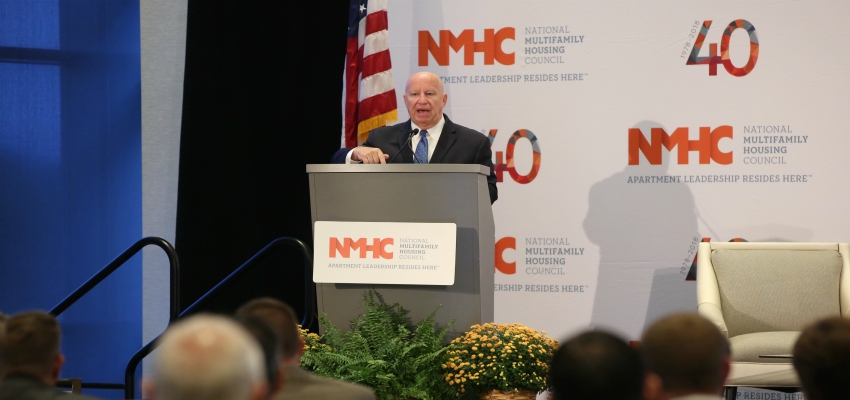
Multifamily ally and tax reform advocate, Congressman Kevin Brady, pictured at the NMHC Fall Meeting.
House Ways and Means Committee Chairman Kevin Brady (R-Texas) on November 26 released end-of-year tax legislation that the House could consider as early as later this week. The bill includes several provisions beneficial to the multifamily industry but, unfortunately, does not include a technical correction clarifying a 30-year depreciation period for existing multifamily buildings. The industry is requesting that this fix be added as the legislative process moves forward.
In a positive development, the House bill includes several clarifications of the tax law, or so-called technical corrections, that would benefit the multifamily industry:
- REIT Dividends: The bill clarifies that taxpayers will be able to deduct 20 percent of REIT dividends attributable to a mutual fund. Absent a clarification, taxpayers may be able to take a 20 percent deduction for REIT dividends only from directly held stock.
- Treatment of Veterans for Low-Income Housing Tax Credit (LIHTC) and Exempt Facility Bonds: The bill clarifies that veterans’ housing complies with both LIHTC’s and exempt facility bonds’ general public use requirements.
As previously stated, the House bill does not include a technical correction clarifying that multifamily properties placed in service prior to 2018 may be depreciated over 30 years for taxpayers electing out of limits on the deductibility of business interest. Due to a drafting error in last year’s tax reform bill, property placed in service prior to 2018 must be depreciated over 40 years. Firms willing to abide by limits on interest deductibility will be allowed to continue to depreciate their multifamily real estate over 27.5 years.
NMHC/NAA continue to ask both Congress and Treasury Department/Internal Revenue Service to correct this drafting error as part of either legislation or proposed regulations. While not yet in the House bill, the Senate will have an opportunity to amend the House bill should it move forward in that chamber. As a result, we are requesting that Senators include clarifying language before a bill goes to President Trump’s desk.
Finally, the House bill extends two energy provisions through 2018:
- Energy Efficient Commercial Buildings Deduction: This incentive lets owners of buildings with four or more stories deduct between $0.60 and $1.80 per square foot when they install certain energy efficient systems, including HVAC, lighting, and, or building envelope.
- New Energy Efficient Home Credit: This incentive enables developers of new low-rise multifamily properties (three stories or less) to claim a $2,000 per-unit tax credit if those residences achieve a 50 percent energy savings for heating and cooling over the 2006 International Energy Conservation Code (IECC).
For more information regarding tax and accounting, please visit our advocacy page.
Staff Resource
Related Articles
- NMHC-NAA-RETTC Letter to Senate in Support of Reconciliation
- NMHC-NAA-RETTC Reconciliation Support Letter to the Senate
- NMHC-NAA-RETTC Letter to House Majority Whip on "The One, Big, Beautiful Bill"
- Real Estate Industry Carried Interest Letter
- Real Estate Trade Associations Letter to Members of House Ways and Means and Senate Finance Committees on Business SALT



